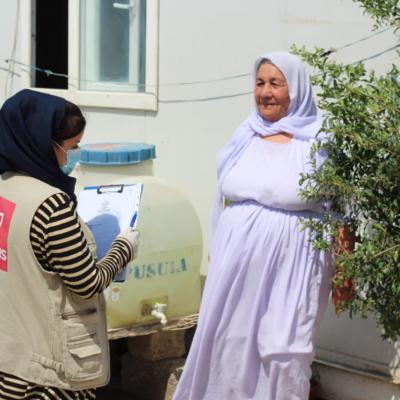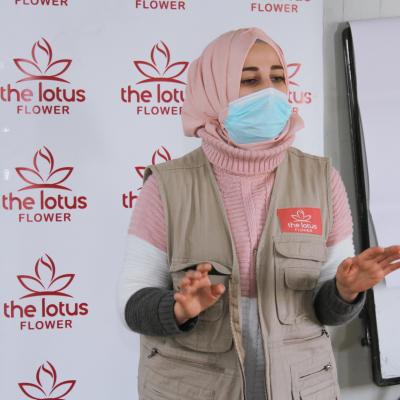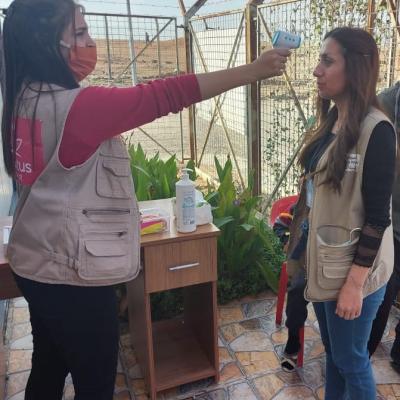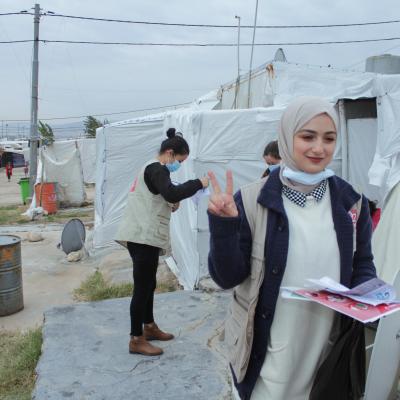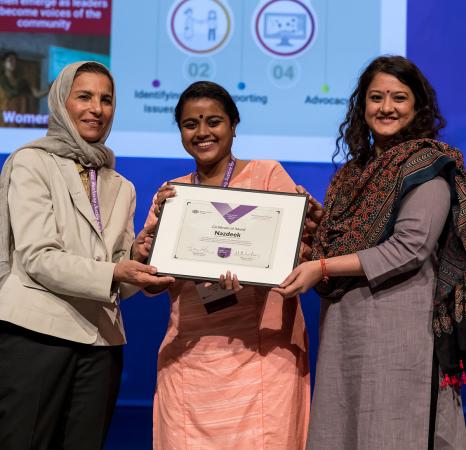Project Pitch and Q&A
Watch the Lotus Flower's World Justice Challenge project pitch and join WJP's World Justice Challenge 2021 Community Forum to ask questions to project representatives, explore additional resources, meet new colleagues, and more. Join the discussion and help us build stronger rule of law values, institutions, and communities around the world.
Ask your question at the Community Forum
Project Summary
Our project is designed to increase capacity for remote and online support for female ISIS survivors who have been most severely impacted by COVID-19. There has been a universally-acknowledged rise in violence and sexual abuse against women and girl refugees and IDPs during the pandemic, causing an escalating mental health crisis. But while their needs are greater than ever, the pandemic has severely harmed our usual programming and face-to-face support. We therefore aim to shift more of our awareness sessions, classes, and therapy to remote and online delivery, while also securing dedicated legal representation for violence and abuse victims.
Problem Statement
The Lotus Flower is a small charity that supports women and girl survivors of the ISIS atrocities of 2014 in Kurdistan, Iraq. The victims we support lost their homes and loved ones, while many were also held as sex slaves and subjected to rape, violence, and torture. Those who were impacted are still struggling to rebuild their lives today, with thousands confined to refugee and IDP camps, and few available resources to help them get back on track.
Since the Lotus Flower was founded in 2016, we have been concerned by the chronic abuse of women's rights and the lack of justice they have endured. Accordingly, Human Rights is one of our six core project pillars, and under this we provide programming that corresponds to the 2030 Sustainable Development Goals, delivered through regular group and individual sessions and community workshops, focusing on education, awareness, and professional psychological therapy.
COVID-19 has badly exacerbated the plight of those we support. An impact and needs assessment we conducted in May 2020 found that 89% of respondents had witnessed or experienced increased gender-based violence during the pandemic. Some 67% of the 300+ respondents also reported a steep rise in sexual exploitation and abuse during the crisis. Our findings corresponded with the UN's warnings over violence, harassment, and sexual abuse against females in Iraq—which it has called a "shadow pandemic."
While women and girls were already exposed to high risks of violence before the outbreak of COVID-19, they now need our services more than ever. Yet providing such support has become increasingly difficult, as continued lockdowns have prevented Lotus Flower staff and other NGOs from entering the camps and their host communities, for any face-to-face activity. Legal recourse for victims has also been almost impossible to pursue due to an acute lack of resources.
Project Description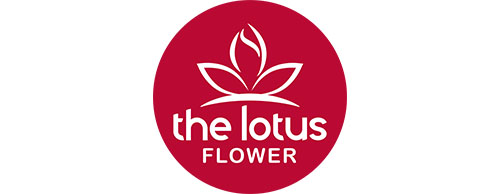
Since our founding in 2016, the Lotus Flower has positively impacted nearly 30,000 women and girls, and the majority of these individuals have directly benefitted from specific activities aimed at improving their human and legal rights. With our support, they feel less shame or embarrassment about past and current ordeals, and they can better recognize abuses of their rights, and know where to turn for help. Conducted by a specialist, our awareness sessions provide an opportunity for women and girls to freely discuss important issues usually considered taboo, and they are encouraged to ask questions and find solutions together, building a network of friendship and support. Sessions with our psychologist help them come to terms with past human rights violations, as well as current physical or emotional abuse that may be occurring, while extending their understanding of their rights in the context of society and their own communities. Furthermore, our support enables women and girls to have a voice and play a greater role in their community and society, which means they are in a stronger position to seek employment and develop new business skills that can withstand the COVID-19 crisis.
Our impact is strengthened by the fact we are local implementers working at a grassroots level. By getting right into the heart of communities, we meet women and girls' needs by listening to the local community and employing them to implement our programs. We have worked tirelessly over the years to earn their trust, and we now have a deep knowledge and understanding of their lives, and, crucially, what is required to improve them.
The Lotus Flower's strategy during the COVID-19 pandemic has been to shift much of our support for women and girls to remote and online delivery. With in-person contact severely restricted as a result of the virus, we have been providing access to a psychologist over the phone, Viber, and WhatsApp. Awareness sessions on GBV and early marriage also shifted to remote delivery, along with language and literacy classes, allowing us to reach nearly 200 people every day during COVID's first wave. This proved an extremely successful and popular innovation, especially as COVID-19 has increased the sense of isolation for many women and girls in the camps, as well as struggles with mental health. But as an under-resourced charity, meeting the increasing demand for these remote services is a major challenge.
Project Impact and Potential for Scaling, Replication, and Sustainability
We continually strive to scale our work, and we are currently focusing on capacity-building and enhancing our technologies in order to maximize our impact and reach. However, the stark escalation in violence and mental health issues being experienced by women and girls in the pandemic means we simply cannot meet current need. With COVID-19 restrictions set to remain in place for the foreseeable future, this situation is unlikely to change. Similarly, the large increase in GBV incidents mean better legal support is needed so that women can act in the interests of their personal human rights.
With financial support and extra resources, scaling our work is eminently achievable; we have already moved many of our services to remote delivery, and we know from beneficiary consultations that this has significantly improved women and girls' wellbeing. What we do is also extremely sustainable, as the post-pandemic world requires exactly the kind of approach where services can be provided in new and innovative ways, which do not always require physical contact.
We plan to extend and scale our work in two ways: firstly by extending our remote services so that we can provide more of our educational classes, awareness sessions, and therapy online or via the phone. One option for scaling is with a responsive online center which we are currently developing. This will ensure our services are fully accessible on a range of devices, in particular on mobile phones.
Secondly, we aim to hire legal representation for women victims of GBV and other forms of violence, and for those who need other legal support, such as residency papers. Previously, we have had to refer legal cases out to other agencies, but funding would allow us to provide a lawyer ourselves. This will enable more cohesive support, which we can monitor and measure far more effectively.
We believe our work could be replicated in any emergency or conflict situation globally, and we plan to grow over the next five years, reaching beneficiaries in new geographical regions. Alongside our three existing women's centers in Kurdistan, we hope to open facilities in the UK, Germany, Bangladesh, Mexico, and Lebanon. By 2025, our goal is to reach 100,000 women and girls annually, across 10 centers. Human rights advocacy, support, and awareness will always be key to what we do, since this is paramount in creating equal, just societies in which women and girls thrive.
Featured Resources
- Preventing Sexual Exploitation & Violence: An Assessment - November 2020 (PDF)
- Post COVID-19 Assessment & Needs Report - May 2020 (PDF)
- Grazia: "How The Yazidi Women Are Fighting Back With Boxing"
- The Guardian: "Experience: I Gave Birth on the Run From ISIS"
- The Lotus Flower in the News
Key Project Links
Social Media: Facebook, Twitter, Instagram, LinkedIn
Website: thelotusflower.org
Submit Your Questions and Get Ready to Pick a Winner!
Representatives of World Justice Challenge 2021 finalist projects are on hand to answer your questions. Join our online Community Forum to engage with finalists, share resources, and network with other members of the rule of law community. Submit your questions now and get ready to vote for your favorite project—voting opens in mid-April!
Join the Conversation
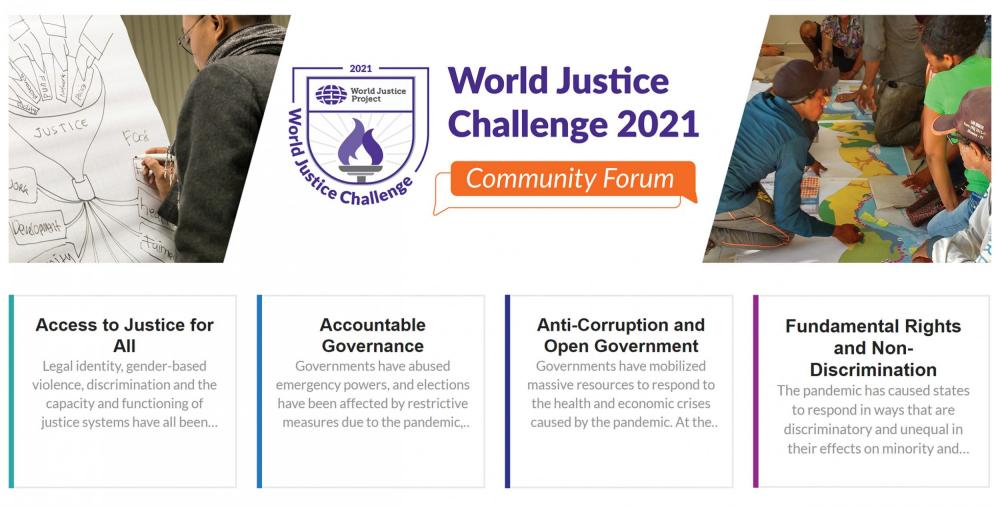
Program Photos
(Click to expand)
